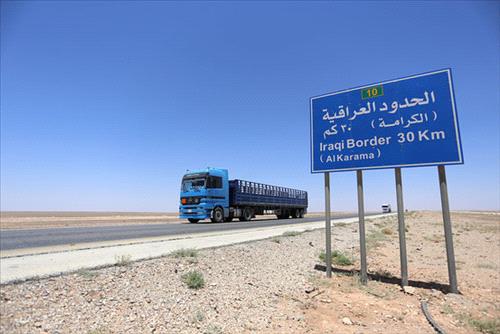Ammon News - AMMONNEWS - Despite dire reports of Islamist fighters overrunning Iraqi border towns, Jordan’s only land crossing with its embattled neighbor on the east has remained open with people and goods continuing regularly to flow across, if at a somewhat reduced rate.
At this remote border outpost in Karameh on Jordan’s eastern frontier, semi trucks rumbled across the border while cars and vans with Iraqi plates drove through the checkpoint, passengers answering a few questions from laconic border guards. The whole scene belying claims of imminent threat to the Hashemite kingdom.
The border has never closed, according to Jordanian officials and people in towns all along the highway from Karameh to Jordan’s capital, Amman, more than 200 miles away. The fully-functioning border has even led Jordanians to question reports that Islamic State of Iraq and Al Sham, or ISIS, ever seized Trebil, the Iraqi town on the border.
“If ISIS came to the border, they’d be burning their bridges,” said a 30-year-old shop owner in Rawashid, a town about half an hour from Karameh. The man, who did not want his name used because he has government contracts, said such a move would cross a “red line” requiring Jordanian authorities to respond decisively.
As it stands, the border has been reinforced, but all that can be seen are a handful of additional armored personnel carriers parked behind berms at the border, unmanned machine guns drooping in the direction of the frontier. Troops were not hunkered down in bunkers, but could be seen in town buying sodas and a green military truck jauntily weaved down the highway, windows down, passengers laughing and stereo blaring.
No photographic proof has been shown, as of yet, that ISIS ever controlled Trebil, said Ahmed Ali, a senior analyst and Iraq team leader at the Institute for the Study of War, a think tank tracking territorial changes in the country. Since ISIS is so savvy with social media, a lack of any self-documentation helps confirm that Trebil did not fall to the ISIS, he said.
“To me, it is clear that ISIS did not take control of the Trebil border crossing,” said Mr. Ali in an email. But, he added, because ISIS has advanced on nearby Rutba, Trebil “could be a potential target for ISIS in the future.”
That sort of uncertainty has crimped business all along the highway, with the economic threat pinching business everywhere.
Those pressures include a in business from Iraqi pilgrims en route to Mecca, Saudi Arabia, for Umrah. The trip is akin to the more well-known Hajj pilgrimage, but something that can take place throughout the year rather than on prescribed dates.
He said the border crossing has some religious significance because Iraqis will often drive to Amman and catch a flight to Saudi Arabia because flights from Baghdad are expensive and Saudi Arabia doesn’t readily let pilgrims cross by land due to security crackdowns.
And many of those pilgrims, as well as other tourists, have stayed home since the ISIS offensive, multiple people on the route said.
“If travelers just hear there’s a protest in Amman, they stop coming to Jordan,” said Rabea Al-Bhari, half-jokingly. He manages a restaurant more than a hundred miles from the border, in the town of Azrac where the roads from Saudi Arabia and Iraq converge and continue to Amman. “In the past 10 days traffic from Iraq has just collapsed,” he said.
Industry has also been hit by renewed instability in Iraq.
“In a week’s time, things have slowed down,” said a 25-year-old Egyptian laborer, who loads and unloads trucks in the fenced-in area sandwiched between the two country’s frontiers. “The borders are open, but there’s less work.”
He sat with a friend in the shade of a billboard just steps away from Jordanian border posts. The man, who was trying to hitch a ride home on one of the passing semi-trucks, and who did not want to give his name for fear of retribution, said although truck owners far away might be frightened, those who live and work in the area know better and aren’t scared.
His friend, a 24-year-old who also declined to give his name, said the recent offensive in Iraq by the ISIS, has slowed business but hasn’t cut it off completely.
“We usually work from 8-to-4” he said. “Now we work one or two hours.” Other laborers, Jordanaians, who waited for their bus home said the border typically sees about 125 trucks a day. Now, they see only 25 or so.
In Rawashid, the first stop in Jordan once crossing the border, a man named Omar was covered in sweat as he walked along the road in more than 100 degree heat. A stonecutter, he said he’s been out of work for about two weeks now since the local quarry halted production because of the fighting. “Look around here, there’s no traffic!” said the 30-year-old, pointing to empty streets that would often be bustling with trucks, he said.
“Life is hard here,” he said, lamenting his lack of work. He shook his head and mocked those he said are unreasonably worried about ISIS charging into Jordan. “People have absent minds and faint hearts,” he said.
*Wall Street Journal
